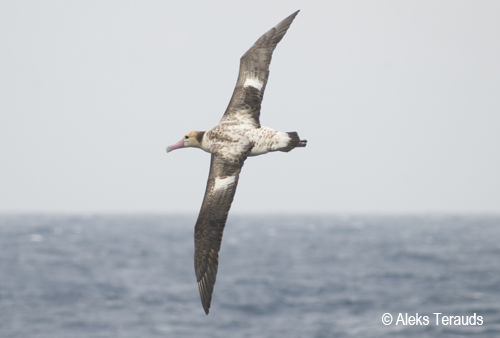In 2003 Canada’s Committee on the Status of Endangered Wildlife (COSEWIC) designated the Short-tailed Albatross Phoebastria albatrus which visits waters off British Columbia as Threatened.
This threatened status was re-examined and confirmed in November 2013 as set out in a recently released report that updates the original one of 2003.
The first and last paragraphs of the 2014 report’s Executive Summary follow:
“The Short-tailed Albatross is the largest North Pacific seabird and, like all albatrosses, is adapted for long-distance oceanic travel. The species was hunted for its feathers and came close to extinction in the 1940s as a result, but is now recovering because of careful management by Japanese biologists. Before the feather harvest, Short-tailed Albatrosses were common off the coasts of the eastern Pacific, but are now rare non-breeding visitors (immatures or adults not actively breeding) primarily to continental shelf areas off British Columbia (1-10 birds, mostly juveniles, observed each year since 1995).
Globally, the species is listed as Vulnerable by the IUCN. The colony at Torishima is well protected but the Minami-kojima colony is in the hotly disputed Senkaku archipelago. There are effective measures to reduce bycatch in U.S. and Canadian fisheries, but there seems to be little effort to protect these birds from bycatch in Japanese, Russian and international waters. In Canada, the species is listed as Threatened on Schedule 1 of the federal Species at Risk Act. In the U.S. the species is listed as Endangered throughout its range under the Endangered Species Act, and in Japan it is listed as a Natural Monument and a Special Bird for Protection.”

Short-tailed Albatross at sea, photograph by Aleks Terauds
The report is also available in French with the title Ếvaluation et Rapport de situation du COSEPAC sur L’Albatros à queue courte (Phoebastria albatrus) au Canada.
With thanks to Ken Morgan and Richard Phillips for information.
Reference:
COSEWIC 2013. COSEWIC assessment and status report on the Short-tailed Albatross Phoebastria albatrus in Canada. Ottawa: Committee on the Status of Endangered Wildlife in Canada. xii + 55 pp.
John Cooper, ACAP Information Officer, 18 October 2014

 English
English  Français
Français  Español
Español